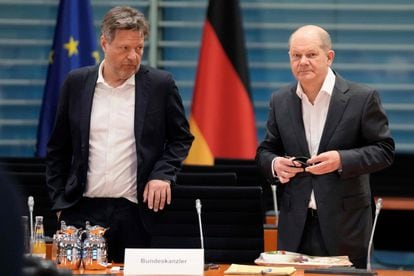The Russian invasion of Ukraine has made it clear to the German government that energy policy is also part of geopolitics.
While the first public complaints are beginning to be heard for having cultivated a pernicious dependence on Russian hydrocarbons for decades, Berlin is making a move and accelerating the expansion of renewable energies.
More solar and wind, less fossil fuels, and as soon as possible.
The war has shown that the growth of green energy "is more urgent than ever," says the Minister of Economy and Climate, the green Robert Habeck.
Ending Russian energy imports as soon as possible has become one of Habeck's main concerns.
But without losing sight of the fact that the medium-term objective is to dispense with all hydrocarbons.
The minister presented this Wednesday a package of measures to speed up the construction of wind farms and photovoltaic plants throughout the country.
Laws will have to be modified and resistance overcome, because the objective is ambitious: Germany wants to obtain 80% of its energy from renewable sources in 2030. It means doubling the contribution of green energies in just eight years, from the current 41%.
The previous target for that date was 65%.
In five more years, in 2035, all electricity should already be produced with renewables, according to Habeck's plans.
The package of measures "lays the foundation for Germany to become a climate-neutral country," the minister said.
Germany set by law, still with Angela Merkel in power, the goal of climate neutrality for 2045, five years before the forecast managed by the European Union.
She did so after a Constitutional ruling that forced greater ambition in the fight against the climate emergency and months of elections marked by the push of the Greens, who ended up entering the new coalition government.
The expansion of renewables cannot replace Russian coal, oil and gas imports in the short term, but the Executive of the Social Democrat Olaf Scholz has proposed to take advantage of the crisis situation to give a boost to the energy transformation.
Berlin has given its approval to include the Russian coal embargo in the next package of sanctions against Moscow that the European Union is preparing.
Oil will follow in second place and, finally, gas, the most difficult to replace.
Scholz has urged European partners to take advantage of the unity they have managed to forge after the invasion of Ukraine to undertake energy reforms.
The EU "must be independent of fossil resources," he said Wednesday in the Bundestag.
German Chancellor Olaf Scholz (r) and Minister Robert Habeck, left. MARKUS SCHREIBER (AFP)
The coalition of Social Democrats, Greens and Liberals came to evaluate the option of extending the useful life of the last three nuclear reactors that remain in Germany, but has finally rejected it due to the technical difficulties that it would entail and the refusal of the owner companies.
The plants will close on December 31 as planned.
Given this scenario, in the short term there is no other option than to continue importing hydrocarbons, albeit from another source.
"We want to have liquefied gas terminals as soon as possible," Scholz stressed Wednesday in the Bundestag.
Germany wants to build its own regasification plants in record time to receive natural gas from other exporters.
More offshore wind and solar subsidies
Habeck's renewable offensive will include from greater subsidies for the installation of solar panels, to the creation of new areas to build offshore wind farms, through the modification of administrative procedures so that projects do not spend years mired in bureaucracy, as has been happening until now.
The minister arrived at the press conference in Berlin with the 600 pages of his plan under his arm, an image that illustrated what he described as "the largest package of energy policies in the last two decades".
To speed up the projects, the declaration of renewable energies as of "outstanding public interest and a service to public security" will be crucial.
This principle will make it more difficult to paralyze wind farm procedures, whose expansion has slowed down in recent years due to protests from neighbors but also due to the existence of regional laws with requirements that make their implementation practically impossible.
Bavaria approved in 2014 the norm known as 10H, which stipulates a minimum distance of 10 times the height of the wind turbines from the nearest building.
Since then practically no wind turbines have been erected: all the new wind capacity has been installed in the northern half of the country.
The current rate should be tripled to achieve the objectives set by the Government.
The legislative changes, which affect various regulations in force, will have to be approved in the Bundestag.
And first Habeck will have to iron out details with his liberal associates, who have already announced small objections.
The measures could take effect on July 1.
In the plan, called "Easter package", the regulatory change that would force at least 2% of German territory to be dedicated to this type of project does not appear at the moment, as the tripartite announced a few months ago.
“On the one hand, the climate crisis is reaching a critical point.
On the other hand, the Russian invasion shows how important it is to gradually eliminate fossil fuels and promote the expansion of renewable energies”, assured Habeck, who has supported the chancellor in his refusal to cut off the import of Russian gas as more and more voices are demanding, especially after the atrocities committed in the Ukrainian city of Bucha.
The Greens minister maintains, like Scholz, that Germany cannot do without Russian gas from one day to the next.
According to his calculations, he would need two years to meet his dependency, which was 55% last year.
You can follow CLIMA Y MEDIO AMBIENTE on
and
, or sign up here to receive
our weekly newsletter
Exclusive content for subscribers
read without limits
subscribe
I'm already a subscriber

